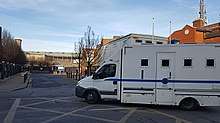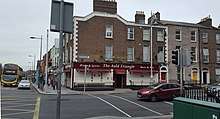The Auld Triangle
"The Auld Triangle" is a song, usually attributed to Brendan Behan, which he made famous when he included it in his 1954 play The Quare Fellow. He first performed it publicly in 1952 on the RTE radio programme 'The Ballad Maker's Saturday Night', produced by Michaeal O hAodha. Behan's biographer, Michael O'Sullivan, recorded, 'It has been believed for many years that Brendan wrote that famous prison song but Michaeal O hAodha says he never laid claim to authorship. Indeed he asked him to send a copyright to another Dubliner, Dick Shannon.'[1] When he recorded the song for Brendan Behan Sings Irish Folksongs and Ballads (Spoken Arts 1960), Behan introduced it with these words: 'This song was written by a person who will never hear it recorded, because he's not in possession of a gramophone. He's…he's… pretty much of a tramp.'
Shannon's authorship was asserted by his relatives in discussions on the Mudcat Cafe folksong forum. Here, Deasún ÓSeanáin, his nephew, recorded: 'My father Thomas Shannon told me as far back as the 1950s that Dickey had written it. Dickey is buried in Manchester. It would be nice to see a plaque erected indicating him as the author.'[2] Shannon's grandson Tom Neary posted: 'I can confirm that it was indeed Dicky Shannon who penned the song for Behan. Brendan and Dicky were very close pals, as well as drinking mates....I have many stories of their escapades together....Brendan always credited Dicky for the song because they were great pals, however, I can verify that Dicky never received a penny in royalties and neither did his family...I must also point out that grandad was not in fact a tramp, but was a highly articulate man with a very dry sense of humour, which could cut you to the quick without degrading you. He was also a very tough man who had literally fought his way through life in the Liberties.'[3]
The first commercial recording was by Brendan's brother Dominic Behan on his 1958 Topic album, Irish Songs. On the liner notes, he wrote, 'The Old Triangle is a song of Mountjoy Prison and was made popular in the play "The Quare Fella" by Brendan Behan of Dublin.'[4]
The song was later made famous by Luke Kelly, Ronnie Drew and The Dubliners in the late 1960s, and was revived for a new audience by Irish rock band the Pogues on their 1984 album Red Roses for Me.

Content
The song is used to introduce the play, a story about the occurrences in a prison (in real life Mountjoy Prison where Behan had once been lodged) the day a convict is set to be executed. The triangle in the title refers to the large metal triangle which was beaten daily in Mountjoy Prison to waken the inmates ("The Auld Triangle goes Jingle Jangle"). The triangle still hangs in the prison at the centre where the wings meet on a metal gate. It is no longer used, though the hammer to beat it is mounted beside it. In the original play by Brendan Behan, the song is written as the "old triangle" not "auld triangle".
The triangle was rung regularly to signify points in the prison's routine.

A second level of meaning is hinted at in the final verse in which the singer imagines himself dwelling in the women's prison. Another mourns the separation from "his girl Sal". These hint at the internal erotic fantasies that prisoners use to separate themselves from the harsh prison environment. In this meaning the old triangle becomes the female pudenda and the Royal Canal the vagina. [5]
As with many Irish ballads, the lyrics have been changed with each passing cover. For example, the Dropkick Murphys recording condenses the structure into a three-lyric section song with a chorus based on the last two lines of each stanza in the original.
Chorus
And the auld triangle went jingle-jangle
All along the banks of the Royal Canal
Recordings
This song has been recorded by:
- Dominic Behan, Irish Sings (Recalled by Dominic Behan), Topic, 1958
- Brendan Behan, Brendan Behan Sings Irish Folksongs and Ballads, Spoken Arts, 1960
- Ian & Sylvia as "The Royal Canal" for their Four Strong Winds album in 1963
- The Clancy Brothers & Tommy Makem on Ain't It Grand Boys (recorded 1964, released 1995, as "Royal Canal") and The Bold Fenian Men (1969, as "The Old Triangle")
- Liam Clancy as "Royal Canal" on his self-titled 1965 album (reissued with additional tracks in 1999 as Irish Troubadour)
- The Dubliners, on several albums, notably the 1967 album More of the Hard Stuff
- Bob Dylan and The Band also recorded a rendition of the song during their Basement Tapes sessions in 1967. This recording is available on bootleg recordings but does not appear on the official The Basement Tapes album released in 1975. It finally appeared in 2014 on the official release, The Bootleg Series Vol. 11: The Basement Tapes Complete.
- Ronnie Drew, on his 1975 self-titled solo album
- The Pogues on the 1984 album Red Roses for Me
- Lifvens Vänner Swedish band recorded this song for their album "Lifvs Levenes", released 1997.
- The Oysterband for their 1998 'Alive and Acoustic' recording
- Dropkick Murphys on the 2005 album The Warrior's Code. Their version was also included on the compilation Vans Off the Wall Volume VII.
- Bert Jansch for his 2006 album The Black Swan
- Jeff Tweedy on his tour DVD Sunken Treasure: Live in the Pacific Northwest, 2006
- Cat Power for her 2008 EP Dark End of the Street
- The High Kings on The High Kings (2008)
- Patrick Clifford, on Chance of a Start, 2012
- Chris Thile, Chris Eldridge, Marcus Mumford, Justin Timberlake and Gabe Witcher for the soundtrack to the Coen Brothers' 2013 film Inside Llewyn Davis[6]
- Ryan Boldt on his 2014 album Broadside Ballads[7]
- The Mahones on their 2014 album The Hunger & The Fight
- Blackthorn on their album Nil na La
- Glen Hansard, lead singer of The Frames, and Damien Dempsey, to raise funds for the charity Society of Saint Vincent de Paul.[8]
Notable performances
The Doug Anthony Allstars performed a medley (a variation on Fred Geis’s "Lament for Brendan Behan" prefacing "The Auld Triangle") on the Australian ABC program The Big Gig in the late 1980s.[9]
The Frames performed it as the final song of a two-hour concert at the Vic Theater in Chicago on 23 November 2010. They performed the song live on RTÉ television's The Saturday Night Show on 18 December of the same year. U2 played a live cover version at Croke Park, Dublin on 24 July 2009 as part of the 360 tour. Bono joined lead singer Glen Hansard on 8 May 2012 in New York City's The Living Room venue to perform the song.[10]
At the Ceiliúradh (celebration) at Royal Albert Hall on 10 April 2014, it was sung by a collection of performers including Glen Hansard, Lisa Hannigan, Elvis Costello, Conor O’Brien (of Villagers), Paul Brady, Imelda May, John Sheahan, Dónal Lunny, Andy Irvine and The Gloaming.
References
- MIchael O'Sullivan, Brendan Behan: A Life, Blackwater Press, 1999, p.163
- Deasún ÓSeanáin 'RE: Origin: The Old Triangle', Mudcat, 21 September 2015
- Tom Neary 'The Ould Triangle', Mudcat, 21 July 2012
- Irish Songs (Recalled by Dominic Behan), details on The Balladeers website
- "The Auld Triangle". | Song of the Isles. Retrieved 25 March 2018.
- "First Listen: Soundtrack, 'Inside Llewyn Davis'". NPR. 3 November 2013. Retrieved 10 November 2013.
- "Ryan Boldt – Broadside Ballads". Folk Radio UK. Retrieved 16 May 2016.
- "The Frames". 2010.theframes.ie. Archived from the original on 10 November 2013. Retrieved 10 November 2013.
- hismerrymen (30 March 2010), DAAS: The Big Gig - The Auld Triangle / Brendan Behan Is Dead, retrieved 11 October 2018
- "Glen Hansard w/ Bono "The Auld Triangle" on Vimeo". Vimeo.com. 8 May 2012. Retrieved 10 November 2013.
External links
- song search for "The Auld Triangle" at allmusic.com.
- "The Auld Triangle" at MusicBrainz (information and list of recordings)
- Mudcat Cafe discussion on the authorship of the song